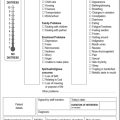1 Personal and public perceptions of cancer
Reflection on previous experiences
Reflecting on our personal and professional experiences can be a good way of understanding what we have encountered. Using a ‘model’ to guide reflection provides structure and helps to devise an action plan in order to develop practice in the future. Although there are many reflective models available, we have used Driscoll’s (2007) reflective model as it is a simple, three-part model that can be adapted to a wide range of situations:
First think back to ‘what’ experience you have of knowing a person with cancer.
Writing a reflective account is also an excellent way of demonstrating the NMC competencies. We return to Driscoll’s model in Section 3 (see Appendix One) so it is good to start using it early on in your preparations. If you have used and feel confident using another reflective model previously, continue to use it instead.
What your perception of cancer may be
Your placement will involve caring for patients who are living or dying with cancer. It is important to remember that patients with cancer do not always die and dying patients do not always have cancer. Much of what you will learn on this cancer/palliative care placement will be transferable to other care settings, as the majority of individuals with cancer are cared for in non-specialist healthcare environments (Gill & Duffy 2010).
The public image of cancer and palliative care
In an attempt to reduce incidence and mortality rates, cancer has become a prominent focus of health policy. Since the Calman–Hine report (Department of Health (DH) 1995) identified a lack of consistency and the need for specialised cancer services across the country, The NHS Cancer Plan (DH 2000) and The Cancer Reform Strategy (DH 2007, 2008a) have set out specific targets and objectives to improve the prevention, diagnosis, treatment, care and research of cancer. A major focus has been to reduce the delay in diagnosis by improving waiting times, speeding up the time from diagnosis to treatment, improving access to treatment and reducing the number of UK deaths from cancer. The way that cancer healthcare professionals work has changed too. Now working in ‘cancer site-specific’ multiprofessional teams, decisions regarding treatment and ongoing care are made based on the expert knowledge, experience and collaboration between practitioners, and in partnership with patients. These developments have had a positive effect on survival of patients and their long-term quality of life.
What the real cancer situation is
In the UK, more than one in three people will develop some form of cancer during their lifetime. There are around 298 000 new cases of cancer (excluding non-melanoma skin cancer) diagnosed each year (Cancer Research UK 2010). Over the past 30 years, the incidence of cancer has increased in the UK by 14% in men and 32% in women although, in the last decade, incidence rates have remained fairly constant.
http://info.cancerresearchuk.org/cancerstats/index.htm (accessed November 2011).
http://www.ncin.org.uk/cancer_information_tools/eatlas.aspx (accessed November 2011).
The End of Life Care Strategy (DH 2008b) suggests that, as a nation, we do not talk openly about dying and death, including the needs of people and their family members as they approach the end of life. In addition, relatively few adults talk about their death, tell family members what their choices would be or make funeral plans. The strategy also suggests the healthcare professionals find it difficult to initiate these discussions or help patients plan ahead. This has an impact on planning future care for individuals and can be very distressing for team members. This practice learning placement is an ideal environment to develop skills and competence in talking about advancing disease, patient choices and professional team working.
Cancer Research UK. CancerStats – cancer statistics for the UK. Online. Available at: London:Cancer Research UK; 2010. http://info.cancerresearchuk.org/cancerstats/index.htm (accessed May 2011)
Department of Health. A policy framework for commissioning cancer services (Calman–Hine report). London: HMSO; 1995.
Department of Health. The NHS cancer plan. London: HMSO; 2000.
Department of Health. The cancer reform strategy. London: HMSO; 2007.
Department of Health. The cancer reform strategy: maintaining momentum, building for the future – first annual report. London: HMSO; 2008.
Department of Health. End of life care strategy. London: HMSO; 2008.
Driscoll J. Practising clinical supervision, 2nd ed. Edinburgh: Baillière Tindall; 2007.
Gill F., Duffy A. Caring for cancer patients on non-specialist wards. British Journal of Nursing. 2010;19(12):761.
Bolton G.E.J. Reflective practice: writing and professional development, 3rd ed. London: Sage; 2010.
Bulman C., Schutz S. Reflective practice in nursing, 4th ed. Oxford: Wiley–Blackwell; 2008.
Johns C., Graham J. Using a reflective model of nursing and guided reflection. Nursing Standard. 1996;11(2):34–38.
Price B., Harrington A. Critical thinking and writing for nursing students. Exeter: Learning Matters; 2010.
Cancer nursing education, videos and other learning materials: http://www.cancernursing.org/ (accessed May 2011).
Department of Health, http://www.dh.gov.uk/en/index.htm (accessed May 2011).
Dying Matters, http://www.dyingmatters.org/ (accessed May 2011).
European Oncology Nursing Society, http://www.cancernurse.eu/ (accessed May 2011).
Macmillan (charity and patient information site), http://www.macmillan.org.uk/Home.aspx (accessed May 2011).
National Cancer Intelligence Network, http://www.ncin.org.uk/cancer_information_tools/eatlas.aspx (accessed May 2011).
National Cancer Intelligence Network, http://www.ncin.org.uk/cancer_information_tools/eatlas.aspx (accessed May 2011).
National Institute for Health and Clinical Excellence, http://www.nice.org.uk/ (accessed May 2011).
National Cancer Institute (USA), http://www.cancer.gov/ (accessed May 2011).
NHS Choices, http://www.nhs.uk/conditions/cancer/Pages/Introduction.aspx (accessed May 2011).
Oncology Nursing Society (USA), http://www.ons.org/ (accessed May 2011).
UK Oncology Nursing Society, http://www.ukons.org/ (accessed May 2011).


